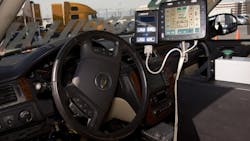Detroit Hiring Talent in Silicon Valley for Race against Auto Technology
For the first time in America’s industrial history, the center for automotive technology is drifting away from Detroit.
Ford Motor Co., aiming to put fully autonomous vehicles into the economy by 2021, announced that it’s doubling the size of its office in Silicon Valley to 260 people and investing in four companies that are key to building self-driving cars. The carmaker’s move follows more than $1 billion in investments made by Detroit-based General Motors Co. in a pair of California technology companies earlier this year to keep up with Google’s autonomous-car project and Uber Technologies Inc.’s ride-hailing business.
While the old-school mechanical engineering remains in the Midwest as does low-skilled factory work that hasn’t moved to Southern states, these investments show Detroit carmakers have realized that they must go to the nation’s technology center to find the software expertise needed to make the autos of tomorrow. Traditional automakers now directly employ hundreds in Silicon Valley, which is also home to Palo Alto-based Tesla Motors Inc.
“The shift to California is undeniable,” said Eric Noble, president of the CarLab consulting firm in Orange, California. “The technological development for autonomous vehicles and intelligent cars will continue to be done in Northern California because that’s where the knowledge is.”
Tough Realities
Ford and GM, racing to stay among the technology leaders, face a few tough realities. Companies like Google and Uber threaten to upend the industry by turning car-owners and drivers into passengers who simply pay for a ride. And even though the carmakers and state of Michigan are developing tech talent, Silicon Valley is still ground zero for the people who write code, create driverless algorithms and come up with new business models for mobility.
Ford has invested in Velodyne Lidar Inc., which develops the laser-based sensors that are the eyes of self-driving cars, and 3-D mapping company Civil Maps, both in California. The Dearborn, Michigan-based carmaker also acquired SAIPS, an Israeli-based computer vision and artificial intelligence designer, and it reached a licensing agreement with Nirenberg Neuroscience LLC. Its founder, Dr. Sheila Nirenberg, has developed a machine-vision platform that Ford said can bring humanlike intelligence to self-driving cars.
“We came to Silicon Valley -- there are a lot of great places around the world -- but the ecosystem here is just unbelievable,” Fields, standing outside on a bright, sunny day, said to reporters. “It’s like a bazaar of ideas, and everybody’s open.”
Smooth Cruise
GM CEO Mary Barra last year took her top leaders to visit tech companies and venture capital firms to get their thoughts on fostering innovation. GM went on to buy a 9 percent stake in Lyft Inc., a competitor to Uber, for $500 million. GM also spent more than that to buy San Francisco-based Cruise Automation, which writes the software for autonomous driving.
Owning Cruise, which has grown from 40 employees to 100, has helped GM hire people who may not have been interested in working for an automaker, Mike Ableson, GM’s vice president of global product planning, said in a June interview. Some people want to remain the California environment but also have the stability of a large company, he said.
Similarly, Ford’s announcement may have been intended to present the maker of F-150 pickups look like an “exciting destination for human talent,” Adam Jonas, an analyst at Morgan Stanley, said in a research note.
“There is at least a perception in the market that all the cool kids are going to places like Uber,” Google, Tesla or China, he wrote. Ford and other automakers “want to change this.”
Michigan Man
Michigan isn’t giving up on talent, Governor Rick Snyder said in a June interview. Snyder, a former chairman of Gateway computers and founder of investment funds, pointed out that Alphabet Inc.’s Google announced in May that it will open a self-driving car research center in suburban Detroit and that Harman International Industries Inc., the audio and automotive technology company, opened its North American headquarters nearby. Amazon.com Inc. has opened a tech center in downtown Detroit.
Snyder said one of Michigan’s biggest challenges is getting the word out that it has great resources for technology companies, especially in the automotive industry. With the University of Michigan focusing on software and technology development, the talent and education system is available for any company that wants to take advantage of it, he said. The university’s Mcity provides carmakers and tech companies with an ersatz town to test driverless cars.
Plus the state has much lower costs of living and doing business than California, especially with real estate prices rising ever faster in Silicon Valley.
“Our challenge is that we don’t do particularly well with telling people,” Snyder said. “That’s something we should do more of, especially when it comes to talking about Detroit’s comeback.”
While the Detroit region has bounced back, its unemployment rate is 5.8% compared with 4.1% in the San Jose, California area, according to the Bureau of Labor Statistics.
More Marketing
Snyder in June unveiled Planet M, an advertising and marketing campaign to tell technology companies that the state has the education and industrial base to be home to new automotive technology research and startups. The tagline is, “Michigan. Where big ideas in mobility are born.”
To compete with the Golden State, Michigan plans to make an autonomous-drive test track out of a 330-acre industrial site near Ypsilanti, where Rosie the Riveter built B-24 bombers during World War II. One selling point: Tough winters and many potholes make the site a better proxy for the imperfect world of driving than California’s decommissioned Navy base in Concord.
“If you look at any place in the world, we have highly developed building blocks,” Snyder said.
By David Welch
About the Author
Bloomberg
Licensed content from Bloomberg, copyright 2016.
